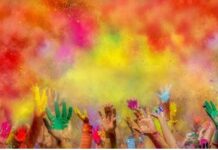

Diwali, also known as Deepavali, is one of the most important and widely celebrated festivals in India, and it holds great significance across various cultural, religious, and social dimensions. Here is a summary of the key significances of Diwali:
- Festival of Lights: Diwali is often referred to as the “Festival of Lights.” The lighting of lamps, candles, and colorful lanterns signifies the victory of light over darkness, knowledge over ignorance, and good over evil.
- Religious and Spiritual Significance: Diwali has religious importance for various communities and is associated with different legends and beliefs. For Hindus, it is the celebration of various significant events, including the return of Lord Rama to Ayodhya after his victory over Ravana and the rescue of Goddess Lakshmi from the ocean of milk.
- Goddess Lakshmi Worship: Diwali is closely linked to the worship of Goddess Lakshmi, the goddess of wealth, prosperity, and good fortune. People clean and decorate their homes to welcome her blessings for a prosperous year ahead.
- Festive New Year: In some regions of India, Diwali marks the beginning of the Hindu New Year. It’s a time for new beginnings, setting goals, and making resolutions for personal and professional growth.
- Cultural Unity: Diwali transcends religious boundaries and brings people from diverse backgrounds together. It serves as a unifying cultural event that fosters a sense of togetherness and social harmony.
- Gift-Giving and Sharing: The exchange of gifts and sweets is an integral part of Diwali celebrations. People exchange gifts with family, friends, and neighbors to express love and goodwill.
- Cracker Bursting: While the bursting of fireworks is a traditional practice during Diwali, it symbolizes the jubilation of the people in honor of the gods. However, there is growing awareness of the environmental impact, and many are opting for eco-friendly celebrations.
- Rituals and Prayers: Special prayers, pujas (worship ceremonies), and religious rituals are performed during Diwali. It’s a time for introspection, meditation, and seeking divine blessings for a harmonious and prosperous life.
- Family and Social Gatherings: Diwali is a time for family reunions and social gatherings. People visit each other’s homes, exchange greetings, and partake in festive meals together.
- Victory of Good Over Evil: Diwali embodies the age-old concept of the triumph of good over evil. It symbolizes the victory of Lord Rama over the demon king Ravana and the vanquishing of negativity and darkness in one’s life.
- Cultural Heritage: Diwali showcases India’s rich cultural heritage, with diverse rituals, traditions, and festivities that vary across regions and communities.
Overall, Diwali is a festival of joy, renewal, and celebration. It plays a crucial role in strengthening cultural and social bonds in India and among Indian communities worldwide. It serves as a reminder of the values of unity, light, and the ultimate victory of goodness over darkness.














